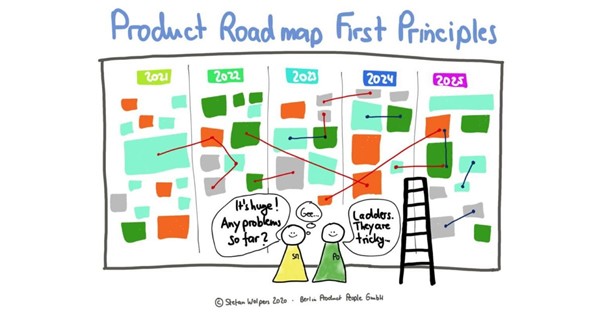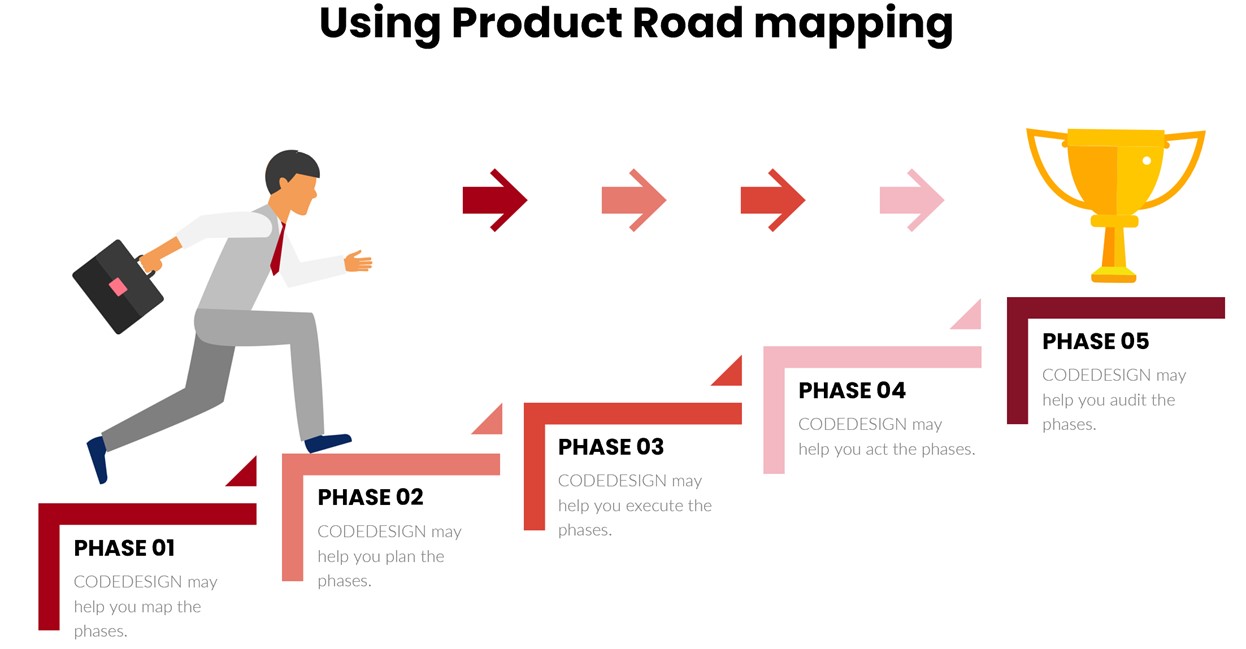7 min to read

Source
Product roadmaps as we know are strategic plans for product development, operations, and sales. They provide an overview of the product’s development cycle; from conception to completion.
According to Harvard Business School professor Clayton Christensen, “every year, 30,000 new products are introduced to the market. And every year, 28,500 of them, or 95 percent, failed to make the cut?”
The reasons for this failure could be many. For example, the product was overhyped or poorly designed, the marketing strategy was weak, or the company underestimated its competition.
Regardless of the cause, using product road mapping in digital marketing is essential to ensure that product launches are successful and yield maximum results. So the key is to find the right tools and processes to create strong, market-ready roadmaps.
Product roadmap tools: unleashing the power of strategic planning
Spreadsheets are a valuable resource for roadmaps, but these complex tools can become overwhelming for digital marketing. And the reason is simple: digital marketing is an ever-evolving space.
Spreadsheets alone cannot keep up with the fast-paced changes and demands of the industry. This is where specialized product roadmap tools come into play. These tools, specifically designed for digital marketing, offer advanced features and functionalities that make managing product roadmaps more efficient and effective.
Top product roadmap tools like Zeda make collaborating and managing your product roadmap easier. These tools provide powerful features like collaboration and reports, third-party integrations, flexibility, and more, enabling teams to quickly map out their product journey. They also provide an external-facing perspective on the product roadmap, allowing stakeholders to view and understand the product’s development cycle easily.
Let's start by revisiting the Product Management event in San Francisco about how to build a product roadmap. This is one of the most interesting available webinars.
Designing effective processes
Effective processes ensure your product stays on track throughout its development. Such processes may include:
- regularly updating, reviewing, and refining your roadmap
- defining clear objectives, milestones, and deliverables before starting any project
- cultivating open and transparent communication channels between teams and stakeholders
- obtaining input from all relevant departments to ensure a comprehensive and holistic view of the product's lifecycle
Benefits of using product roadmap tools for digital marketing
Below we discuss 12 of the key benefits of using product roadmap tools for digital marketing:
1. Alignment of product goals with marketing strategies
Think of your product roadmap as the bridge between your product development and your marketing plans. By synchronizing these elements, your marketing strategies will align more effectively with your product's goals and objectives. For example, if your product development team is focusing on enhancing a specific feature, your marketing team would also emphasize this improvement in their campaigns.
2. Detailed timeline tracking for managing simultaneous digital marketing campaigns
This allows you to visualize and track the progress of multiple marketing campaigns happening at the same time, helping you maintain control and ensure timely completion. It also helps in identifying and resolving bottlenecks, reducing the risk of delayed delivery or misaligned priorities.
3. Improved collaboration and communication between teams
Using a digital roadmap tool facilitates real-time collaboration and seamless communication between various teams, resulting in better teamwork and faster decision-making. For example, improved communication between the development and marketing teams can lead to a more efficient allocation of resources, minimizing misunderstandings and potential conflicts.
4. Data-driven decision making
Product roadmap tools allow you to collect, analyze, and visualize crucial data and insights related to your product, thus helping you make better-informed, data-driven decisions in your digital marketing strategy. This could include analyzing user engagement, conversion rates, demographic reports, and other essential metrics that directly impact your product's success.
A digital agency can help with data-driven decision-making by using analytics to identify patterns in data and track key performance indicators that can inform decisions. They can help organizations understand their customer base, identify trends and develop strategies to improve their business. Additionally, they can help to create detailed reports and visualizations that can be used to monitor success and make more informed decisions.
5. Increased agility and adaptability
Digital marketing landscape constantly evolves, and product roadmap tools allow teams to easily adapt their plans and strategies to new trends, technologies, and market demands. This adaptability minimizes gaps and delays due to changes and accelerates product development.
6. Prioritization of user needs and demands
By utilizing product roadmap tools, you can better understand and prioritize the needs and demands of your users for better product management. This translates into an overall improvement of your product's functionality and user experience, ultimately resulting in increased customer satisfaction and loyalty.
Product roadmap tools provide a way to visualize customer needs, prioritize goals, and track progress. Using such a tool makes it easier to understand what customer needs need to be addressed, how to best meet those needs, and how to keep track of progress. This helps to keep product development on track and focused on the customer's needs and desired outcome. This can result in a product that is better tailored to customer needs, and customer satisfaction and loyalty.
7. Regular progress review and adaptation
Ease of updating and tracking progress on the roadmap helps teams identify any areas that need readjustment or optimization. Consistent reviews and adjustments make it easier to pivot strategies when necessary, ensuring the product's continuous growth and development. Here are two examples:
Example 1:
A product team is working on a roadmap for a new mobile app. They set milestones and deadlines, and then use the roadmap to track their progress. They frequently review the roadmap and make tweaks or adjustments as needed. This allows them to stay on track and ensure the product is evolving and growing as desired.
Example 2
A software development team is implementing a roadmap for a new project. They use the roadmap to plan out tasks and track their progress. They review the roadmap every month and make adjustments as needed based on feedback and changes in the market. This helps them stay agile and pivot as needed, while still keeping the project on track and developing as desired.
8. Increased transparency with stakeholders
Using a digital product roadmap allows stakeholders to view the product's development cycle and have insight into the progress being made. This level of transparency helps to create trust and manage stakeholder expectations effectively.
9. Easier goal-setting and tracking
Product roadmap tools make establishing clear objectives and quantifiable milestones easy, enhancing the team's ability to define achievable goals and track their progress toward the desired outcome.
10. Resource and timeline management
Digital roadmap tools help efficiently allocate resources and manage timelines, ensuring that product development stays on track and within budget constraints. This also minimizes the chances of missed deadlines or resource-related roadblocks.
11. Enhanced reporting and analytics
Product roadmap tools enable teams to generate meaningful reports and analytics that track relevant metrics, such as customer behaviour patterns and trends. These insights help inform strategic decisions and future marketing campaigns.
12. Reduced risk and ambiguity
The clarity provided by product roadmap tools can significantly reduce the risk of confusion and misunderstanding, resulting in a more streamlined and efficient product development process.
How to find the right product roadmap tool
The answer is simple. It understands your needs. Before selecting a product roadmap tool, you must clearly understand your company's needs, objectives, and expectations. Consider the following factors as you evaluate different products:
- Size, scale, and complexity
Determine your projects' complexity, your teams' size, and your product offerings. These criteria will influence the functionalities and features required from the roadmap tool.
- Integrations and compatibility
Ensure the product roadmap tool integrates with your existing project management and communication platforms. Effective integration and compatibility will streamline your workflow even further.
- Budget considerations
Factor in the investment needed to procure the right product roadmap software. Create a budget plan, considering various software options available at different price points, and select one that aligns best with your financial resources and specific needs.

Evaluating available options
As you explore various product roadmap tools on the market, consider the following criteria to help you best evaluate and choose a solution.
- Usability: Make sure the platform is user-friendly and easy for all team members to navigate.
- Customizability: Look for a tool that offers customizable features, layouts, and templates to cater to your team's unique preferences and requirements.
- Collaboration: Review and assess the ability of your chosen tool to support real-time collaboration and communication for team members and stakeholders.
- Scalability: Identify product roadmap tools designed to accommodate your company's growth and evolving needs. Ensure the chosen tool can scale alongside the expansion of your product offerings and increasing team size.
- Testing and trialling
Before committing to a specific product roadmap tool, make sure to explore demo versions or take advantage of the free trials available. This will help you better understand the interface, layout, and features offered by the tool, allowing you to make an informed choice.
User Feedback
Gather feedback from your teammates regarding the trial version of the product roadmap tool. Incorporate their insights and opinions to ensure a collaborative decision that best suits your team's needs.
Product roadmap tools are vital in today's fast-paced and competitive environment. These tools enable teams to plan, execute, and track product development effectively, leading to continuous growth and success.
By carefully considering your company's needs, objectives, and available resources, as well as evaluating and testing different options, you will be able to select a tool that best complements your overall product management and development process.
Implementing a suitable roadmap tool greatly benefits your team by enabling more efficient planning, execution, monitoring, and reporting — ultimately leading to improved product quality and customer satisfaction.
Create winning product roadmaps!
Using product road mapping in digital marketing is invaluable for ensuring product success and minimizing failure rates.
With specialized product roadmap tools, digital marketers can better plan, communicate and execute their strategies, resulting in stronger market penetration and, ultimately, increased revenue.
By identifying opportunities and risk factors, organizations can stay ahead of the competition and continually evolve their operations in line with their overall business goals.
Like this article? Here are more reads for you!
- MARKETING TIPS TO BOOST BRAND REPUTATION
- PERSONALIZATION IN DIGITAL MARKETING: TECHNIQUES AND CHALLENGES
About CodeDesign
Codedesign is a digital marketing agency specializing in e-commerce and B2B online marketing. Our digital team utilizes the latest digital marketing tools and strategies to help clients reach their business goals. We offer comprehensive services such as website design, search engine optimization (SEO), content marketing, performance marketing, social media marketing, CRM and marketing automation, email marketing, and more. Our experts create and implement customized digital marketing campaigns to increase website traffic, generate leads, and drive sales. Our expertise in e-commerce and B2B marketing allows us to understand the nuances of the digital marketplace and create effective marketing solutions tailored to their client's needs.
CodeDesign is leading:
- Digital Agency
- Digital Marketing Agency
- Amazon Marketing Agency
Feel free to contact us to see the unprecedented growth of your business.


Add comment ×